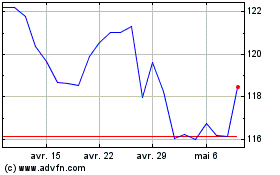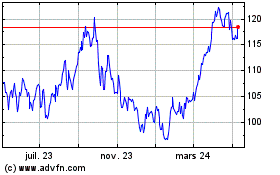LONDON—Saudi Arabia is considering selling shares in its
state-owned oil company, a move that comes amid a broad
privatization effort afoot in the kingdom, but also at a vulnerable
time for Riyadh because of tumbling energy prices.
Any move to list shares in Saudi Arabian Oil Co., better known
as Saudi Aramco, would almost assuredly be limited in scale, and
could exclude its strategic production assets altogether. But an
initial public offering of only a small slice of what is widely
considered one of the world's most valuable companies could raise
billions of dollars. That would bolster government coffers at a
time when global oil prices continue to slide, recently hitting
lows not seen in over a decade.
Riyadh has a sizable cushion of foreign reserves to protect it
from lost oil revenue. But it has also shown some signs of
financial strain, ratcheting down government spending and reducing
generous energy subsidies to save cash.
Talk of a partial listing of Aramco has surfaced from time to
time for years. In an interview with the Economist magazine
published Thursday, Mohammad bin Salman Al Saud, Saudi Arabia's
powerful deputy crown prince, laid out the kingdom's most specific
comments yet on the possibility, while suggesting a decision to
move ahead could be imminent.
"This is something that is being reviewed, and we believe a
decision will be made over the next few months," he told the
British publication. "Personally, I'm enthusiastic about this
step."
A person familiar with the matter said that the idea of somehow
floating a minority stake in the company is under very early
consideration. The Saudi government would retain full control, and
any share sale might be designed to exclude its core
crude-producing business, said the person.
Aramco has the largest proven reserves of any oil company in the
world, pumps around 10 million barrels a day and has the capacity
to churn out 12 million barrels a day.
Aramco said in 2015 that it had proven reserves of over 261
billion barrels of crude oil and condensate. By contrast, Exxon
Mobil Corp., the largest non-state-controlled oil company, had
proven reserves of 25.3 billion barrels of oil equivalent in
2014.
Aramco is also the workhorse that has allowed Saudi Arabia to
operate for decades effectively as the central bank of the world's
oil market. Saudi Arabia is the de facto leader of the Organization
of the Petroleum Exporting Countries, the cartel of some of the
largest producers.
The group for years has intervened in global oil markets,
ratcheting down production to bolster prices and protect revenue
for its members. But in late 2014, Saudi Arabia pushed the group to
reverse course, keep its spigots wide open and compete for global
market share with booming U.S. producers, exacerbating the falling
oil price.
Aramco also controls massive refining assets both inside Saudi
Arabia and abroad. While overseen directly by the government,
Aramco has long been run somewhat at arm's length from the
country's oil ministry. Executives pride themselves on a level of
operational independence from the government.
The listing proposal comes as Saudi Arabia for the first time
allows foreign investors to buy shares in its stock market, known
as the Tadawul. Saudi officials hope the market opening will
attract foreign investment at a time when the government has to cut
back on capital spending.
Government revenue has fallen with oil prices, which have
dropped by two thirds in the past 18 months. The government ran a
record deficit last year.
Prince Mohammed bin Salman, a son of King Salman bin Abdulaziz
who has been given oversight of the kingdom's economic-development
plans as well as its oil industry, told the Economist a share
listing could help on both fronts.
"I believe it is in the interest of the Saudi market, and it is
in the interest of Aramco, and it is for the interest of more
transparency, and to counter corruption, if any, that may be
circling around Aramco," he was quoted as saying. The prince didn't
provide further details of how any initial public offering would be
made.
Aramco has previously listed a subsidiary, Rabigh Refining and
Petrochemical Co., in 2008 in the local stock exchange. The
refinery, which processes 400,000 barrels a day, has a market
capitalization of $2.33 billion.
Given Aramco's strategic importance, many of the operational and
geological specifics related to Saudi production and reserves are
treated essentially as state secrets. Listing the company might
subject Aramco to disclosure requirements and call for a new level
of transparency that could complicate the government's preference
for operating out of the public eye. That is one reason officials
might choose not to include the heart of Aramco in any share
sale.
"Officials realize that listing shares in the core business
would mean more transparency and more disclosures on finances,
production figures, etc.," said the person familiar with the
discussions.
The deputy crown prince's comments come after Saudi officials
said last year that both Aramco and the kingdom's petroleum
ministry could be restructured. Part of the plan is to expand the
ministry into a full-fledged energy ministry that will also oversee
water and electricity, as well as nuclear and renewable energy
sources.
The plan is being discussed by the Supreme Economic Council,
formed last year and headed by the deputy crown prince. It replaces
the Supreme Petroleum Council, which used to help set the kingdom's
oil policy.
A new supreme council for Aramco was also created last year that
is above Aramco's board of directors. Prince Mohammad bin Salman is
chairman of the new supreme council, while former Aramco Chief
Executive Khalid al-Falih heads Aramco's board of directors.
Write to Kevin Baxter at Kevin.Baxter@wsj.com
(END) Dow Jones Newswires
January 07, 2016 21:25 ET (02:25 GMT)
Copyright (c) 2016 Dow Jones & Company, Inc.
Exxon Mobil (NYSE:XOM)
Graphique Historique de l'Action
De Juin 2024 à Juil 2024

Exxon Mobil (NYSE:XOM)
Graphique Historique de l'Action
De Juil 2023 à Juil 2024
